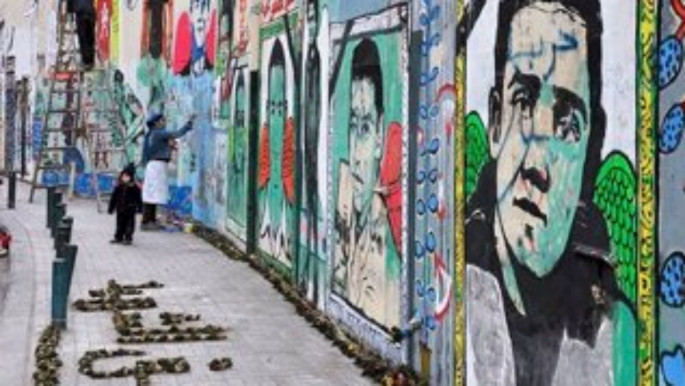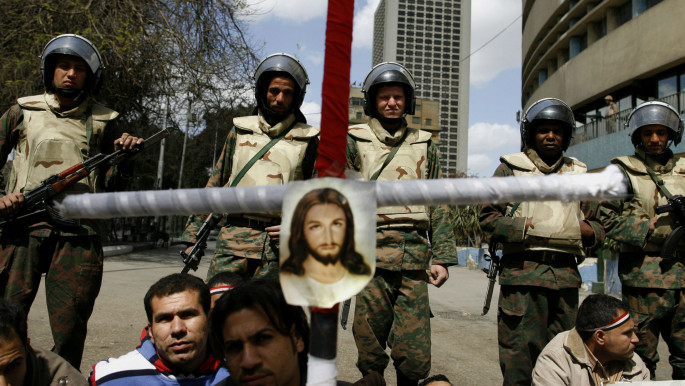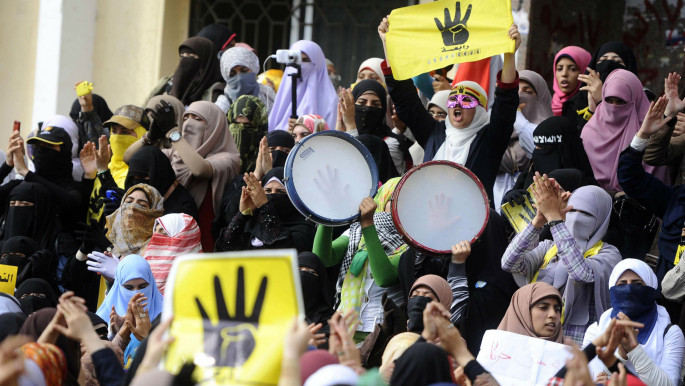Special coverage: The anniversary of Egypt's revolution
On 25 January 2011, Egypt erupted in the now-infamous "Day of Anger". Protests had been planned to decry police abuses - but demonstrations swelled far beyond organisers' plans. This was the revolution the people had been fighting for.
5 min read
On that fateful Tuesday, protests marched to the Ministry of Interior in Cairo. They demanded the resignation of the Minister of Interior, a fair minimum wage, an end to the "emergency law" - in place for more than 30 years - and set term limits for the president.
In the days that followed, the numbers swelled, and the resolute determination for change became ever stronger.
This was the Egyptian revolution. The victory for people power in Tunisia had spilled over. It now became possible to talk of an Arab moment, an awakening, an Arab Spring.
Hundreds of thousands of people spilled into the streets. Their demands were the same. Bread. Freedom. Social Justice.
The events that followed were watched around the world, as long-time President Hosni Mubarak eventually bowed to the demands of the masses and left office.
The revolution had been won, many protesters believed. In the months that followed, elections were held, and many believed Egypt was finally on the road to democracy.
But the Egyptian revolution was rolled back. The army again took control, ousting the country's first freely elected president in 2013. New/old elections followed, a reminder of of pre-revolutionary days. Abdel Fattah al-Sisi, the army general who headed the coup won - by 96.1 percent.
A flame was lit on that January morning, four years ago. A flame that might flicker, but one which won't go out. Al-Araby al-Jadeed remembers and looks ahead.
In the days that followed, the numbers swelled, and the resolute determination for change became ever stronger.
This was the Egyptian revolution. The victory for people power in Tunisia had spilled over. It now became possible to talk of an Arab moment, an awakening, an Arab Spring.
| Scarabeuz and Omaima: Long live Egypt |
Hundreds of thousands of people spilled into the streets. Their demands were the same. Bread. Freedom. Social Justice.
The events that followed were watched around the world, as long-time President Hosni Mubarak eventually bowed to the demands of the masses and left office.
The revolution had been won, many protesters believed. In the months that followed, elections were held, and many believed Egypt was finally on the road to democracy.
But the Egyptian revolution was rolled back. The army again took control, ousting the country's first freely elected president in 2013. New/old elections followed, a reminder of of pre-revolutionary days. Abdel Fattah al-Sisi, the army general who headed the coup won - by 96.1 percent.
A flame was lit on that January morning, four years ago. A flame that might flicker, but one which won't go out. Al-Araby al-Jadeed remembers and looks ahead.
 |
 |
| Feature: Hope in a spraycan - Egypt's street artists keep tagging by Farid Farid |
Feature: A honeymoon for Gaza, but now it's over by Rami Almeghari |
| Graffiti artists draw on their experiences to paint a brighter future. | Egypt's 2011 revolution had a knock-on effect in Gaza as ties warmed between Hamas and Egypt's new president, Mohamed Morsi. But that soon changed. |
 |
 |
| Analysis: Egypt at a post-revolution nadir, says rights group by al-Araby staff |
Comment: An Egypt I no longer recognise by Basheer al-Baker |
| Human Rights Watch's annual report says Sisi has systematically reversed the gains of Egypt's 2011 revolution and attacked the civil liberties of his people. | Egypt has been turned upside down by Abdel Fattah al-Sisi. But the rule of Abdel Fattah al-Sisi is flawed and will not last forever. |
 |
 |
| Feature: Military muscles in on Egyptian justice by al-Araby staff |
Blog: Cairo - a conversation you start but never finish by Raafat Majzoub |
| More than 1,300 civilians have been tried in military courts since the passing of a law last year, which turns institutions including universities into military facilities. | Egypt's capital is a crazy, absurd, emotive and sensual city no matter which ruler sits on the throne. It is a place that persists and transcends politics and change. |
 |
 |
| Blog: Blankets, rice pudding... and angry faces by Tarik Hamdan |
Comment: A very Arab media ethics coup by Ali Anouzla |
| I lived near Tahrir Square as the January 25 revolution kicked off. I did what I could to help the protesters, but soon found out not everyone backed me. | Morocco and Egypt have been fighting a war of words through their state media. But after Cairo won over Rabat, Morocco's media have obligingly followed their political masters. |
 |
|
| Gallery - Beyond the revolution: The rise of Sisi | |
 |
 |
| Feature: Khaled Ali - 'Privatisation has stolen Egypt from its people' by Haitham Muhammadeen |
Comment: Egypt's revolution was dangerous and had to be crushed by Lamis Andoni |
| Q&A: Prominent Egyptian lawyer and activist Khaled Ali talks exclusively about the effects of privatisation in Egypt, and its apparent return under the rule of Sisi. | The call for social justice that echoed through the Arab revolutions threatened the international economic order, and so revolutionaries had to face the consequences. |
 |
 |
| Comment: We are all Shimaa el-Sabagh now by Gigi Ibrahim |
Feature: United by a dream, killed by the state by al-Araby staff |
| Shimaa el-Sabagh died holding flowers and calling for freedom and justice in Egypt. She is one of thousands killed by an unjust and brutal regime. We shall not forget. | Egypt's revolutionaries fought tanks with rocks and faced down bullets with banners. Al-Araby-al-Jadeed remembers five people who died standing up to tyranny. |
 |
|
| Egypt's revolution in pictures | |
 |
 |
| Comment: Textile workers' strike stirs discontent by Hossam el-Hamalawy |
Comment: The captives of Egypt's revolution by Malek Adly |
| Mahalla is a hotbed of industrial unrest, but the latest strike comes at a time when a crackdown on dissent has weakened street protests. |
The Egyptian judiciary is a tool of the regime and has been used to quash opposition and all forms of dissent. Pity its victims. |
 |
 |
| Feature: Four years of grief and still no justice by al-Araby staff |
Analysis: Military capitalism expands in Sisi's Egypt by Ibrahim al-Sahary |
| Mohab Hassan was 19 when he was shot dead on the Friday Day of Rage in Egypt's 2011 revolution. His father, Abu Mohab, speaks to al-Araby al-Jadeed about the years since his death. | The 2013 counter-revolution has allowed the army to consolidate its grip on the economy. It is estimated it now controls up to half of Egypt's economic activity. |
 |
 |
|
Comment: Church and state - a window on Egypt's revolution |
Comment: Egypt's students must find strength through unity by Ahmed Bakr |
| The rise and fall of Egypt's Arab Spring can be neatly traced through the severing and restoration of the country's church-state alliance. | Universities have always been a battleground for political ideas. But factions must come together and find new ways to work against the counter-revolution - spilling more blood is a futile act. |




 Follow the Middle East's top stories in English at The New Arab on Google News
Follow the Middle East's top stories in English at The New Arab on Google News


